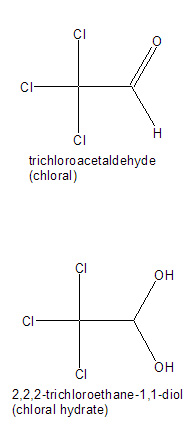Chloral hydrate
- Chloral hydrate is a sedative and hypnotic medication that has been used for many years to promote sleep and reduce anxiety.
- It belongs to the class of drugs known as sedative-hypnotics.
- Chloral hydrate is primarily used as a short-term treatment for insomnia and for sedation during medical procedures.
Mechanism of Action[edit | edit source]
- The exact mechanism of action of chloral hydrate is not fully understood.
- However, it is believed to act as a prodrug, meaning that it is converted into another active compound in the body.
- In the case of chloral hydrate, it is metabolized in the liver to form trichloroethanol, which is responsible for its sedative and hypnotic effects.
- Trichloroethanol enhances the activity of the neurotransmitter gamma-aminobutyric acid (GABA) in the brain.
- GABA is an inhibitory neurotransmitter that helps to calm the activity of nerve cells, leading to sedation, relaxation, and sleepiness.
Medical Uses[edit | edit source]
- Chloral hydrate is primarily used for the short-term treatment of insomnia, especially in situations where other sleep medications may not be suitable.
- It is also used for sedation during medical procedures, such as dental treatments or minor surgical interventions.
- However, due to the availability of safer and more effective sedative alternatives, the use of chloral hydrate has become less common in recent years.
Administration and Dosage[edit | edit source]
- Chloral hydrate is typically administered orally in the form of a liquid solution or capsules.
- The dosage will depend on various factors, including the individual's age, weight, and the specific medical condition being treated.
- It is important to follow the prescribed dosage and instructions provided by a healthcare professional.
- Chloral hydrate should only be used for short periods as directed by a healthcare professional.
- Prolonged or excessive use of chloral hydrate can lead to tolerance, dependence, and withdrawal symptoms.
Contraindications[edit | edit source]
- Chloral hydrate is contraindicated in certain situations.
- Contraindications are specific circumstances or conditions in which the use of a medication is not recommended due to potential risks.
Some contraindications for chloral hydrate include:
- Hypersensitivity: Individuals who have a known hypersensitivity or allergy to chloral hydrate should not use this medication.
- Severe Respiratory Impairment: Chloral hydrate can depress the respiratory system, so it should be used with caution or avoided in individuals with severe respiratory impairment, such as respiratory failure or severe chronic obstructive pulmonary disease (COPD).
- Liver Disease: Individuals with severe liver disease may have impaired metabolism of chloral hydrate, leading to an increased risk of adverse effects. The use of chloral hydrate should be approached with caution in such cases.
- It is important to consult with a healthcare professional to assess individual suitability and determine the appropriate use of chloral hydrate.
Adverse Effects[edit | edit source]
- Chloral hydrate may cause various adverse effects, which can vary in severity and frequency among individuals.
Common adverse effects include:
- Drowsiness and Sedation: Chloral hydrate is a potent sedative, and drowsiness is a common side effect. Individuals should avoid engaging in activities requiring alertness, such as driving or operating machinery, while under the influence of chloral hydrate.
- Gastrointestinal Disturbances: Nausea, vomiting, stomach discomfort, and diarrhea may occur as side effects of chloral hydrate.
- Respiratory Depression: Chloral hydrate can suppress the respiratory system, leading to slower or shallower breathing. This effect is more likely to occur at higher doses.
- Paradoxical Reactions: In rare cases, chloral hydrate can cause paradoxical reactions, such as agitation, excitement, confusion, or hallucinations. If these symptoms occur, medical attention should be sought.
- Tolerance, Dependence, and Withdrawal: Prolonged use of chloral hydrate can lead to tolerance, dependence, and withdrawal symptoms when discontinuing the medication. It is important to use chloral hydrate as directed and under medical supervision to minimize the risk of these effects.
Overdose[edit | edit source]
- An overdose of chloral hydrate can be dangerous and potentially life-threatening.
- Symptoms of overdose may include severe sedation, respiratory depression, confusion, hypotension (low blood pressure), and even coma.
- In case of suspected overdose, immediate medical attention should be sought.
See Also[edit | edit source]
Search WikiMD
Ad.Tired of being Overweight? Try W8MD's physician weight loss program.
Semaglutide (Ozempic / Wegovy and Tirzepatide (Mounjaro / Zepbound) available.
Advertise on WikiMD
|
WikiMD's Wellness Encyclopedia |
| Let Food Be Thy Medicine Medicine Thy Food - Hippocrates |
Translate this page: - East Asian
中文,
日本,
한국어,
South Asian
हिन्दी,
தமிழ்,
తెలుగు,
Urdu,
ಕನ್ನಡ,
Southeast Asian
Indonesian,
Vietnamese,
Thai,
မြန်မာဘာသာ,
বাংলা
European
español,
Deutsch,
français,
Greek,
português do Brasil,
polski,
română,
русский,
Nederlands,
norsk,
svenska,
suomi,
Italian
Middle Eastern & African
عربى,
Turkish,
Persian,
Hebrew,
Afrikaans,
isiZulu,
Kiswahili,
Other
Bulgarian,
Hungarian,
Czech,
Swedish,
മലയാളം,
मराठी,
ਪੰਜਾਬੀ,
ગુજરાતી,
Portuguese,
Ukrainian
Medical Disclaimer: WikiMD is not a substitute for professional medical advice. The information on WikiMD is provided as an information resource only, may be incorrect, outdated or misleading, and is not to be used or relied on for any diagnostic or treatment purposes. Please consult your health care provider before making any healthcare decisions or for guidance about a specific medical condition. WikiMD expressly disclaims responsibility, and shall have no liability, for any damages, loss, injury, or liability whatsoever suffered as a result of your reliance on the information contained in this site. By visiting this site you agree to the foregoing terms and conditions, which may from time to time be changed or supplemented by WikiMD. If you do not agree to the foregoing terms and conditions, you should not enter or use this site. See full disclaimer.
Credits:Most images are courtesy of Wikimedia commons, and templates, categories Wikipedia, licensed under CC BY SA or similar.
Contributors: Deepika vegiraju



